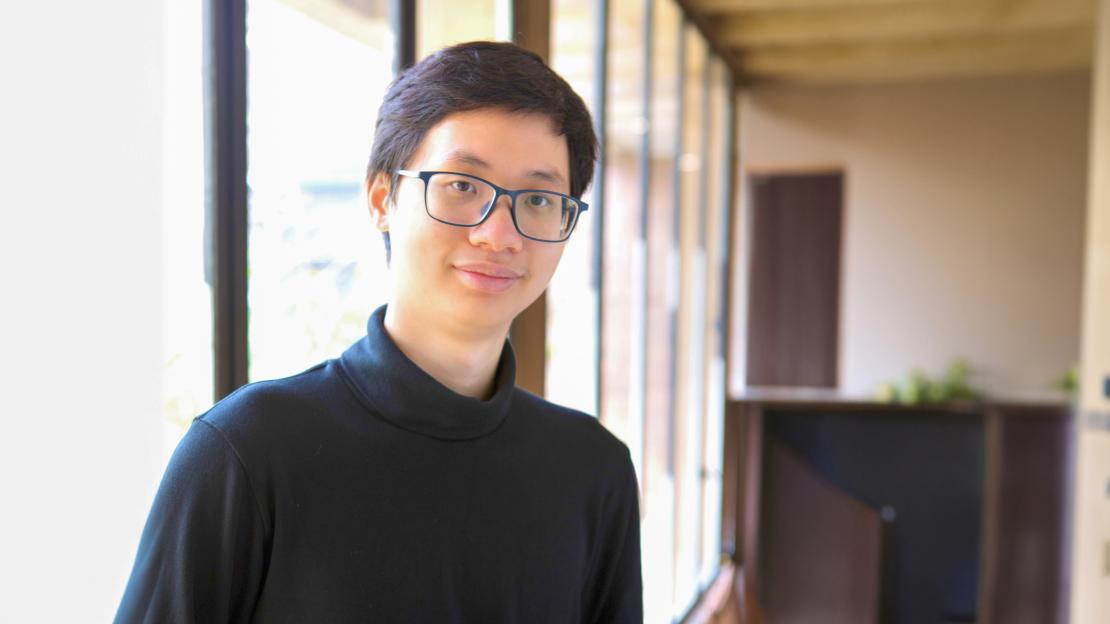Sapolnach Prompiengchai, a fourth-year neuroscience student at U of T Scarborough, has received a prestigious Global Rhodes Scholarship from the University of Oxford.
Prompiengchai, who got the good news on Saturday evening after a successful in-person interview with the scholarship committee, says he likely lost his voice over the weekend from the excitement.
“I probably lost my voice from talking to so many incredible people at the University of Oxford and then calling everyone to share the news,” he says “It’s been a surreal experience. I wasn’t expecting it at all, but I’m humbled and grateful to everyone who has supported me.”
The Rhodes Scholarship is the oldest and one of the most prestigious international scholarship programs in the world. The Global scholarship was introduced in 2019 and is available to candidates from anywhere in the world. It covers expenses for a postgraduate degree at the University of Oxford and is awarded to students based on outstanding intellect, character, leadership and commitment to making a positive impact on the world.
One of the ways Prompiengchai is already making an impact is through mental health research and advocacy. He has experience working in five research labs specializing in different disciplines including clinical neuroscience, memory and educational psychology.
I think the multidisciplinary experience I’ve had at UTSC is one of the most important reasons why I got the Rhodes Scholarship.
He is currently working in Professor Andy Lee’s cognitive neuroscience lab at U of T Scarborough where he is doing functional magnetic resonance imaging (fMRI) experiments to discover how the brain encodes time when memories are formed.
“Learning brain imaging techniques such as fMRI is such a valuable experience,” says Prompiengchai, who grew up in Thailand before moving to India at age 9 to attend boarding school.
“I want to study which treatments work best, so if I want to know which targeted medication works best for treating depression, for example, it’s important to know which the areas of the brain are activated. One of the best ways to do that is through sophisticated imaging techniques like fMRI.”
A 2020 recipient of a Pearson Scholarship, Prompiengchai first came to Lee’s lab in May of 2022 through the U of T Excellence Award (UTEA) program and is now working on his second project in the lab. Lee says what stands out about Prompiengchai is his ability to balance excellent grades with all of his research commitments.
“He’s just really curious,” says Lee. “Not only will he complete an fMRI analysis, he will also want to know everything about the principles behind that analysis. That insatiable curiosity is a tremendous quality to have as a researcher.”
Diversity of experience
This past year Prompiengchai also took part in the launch of Inlight, an Institutional Strategic Initiative that aims to improve mental health and wellness among post-secondary students. He was a member of Inlight’s student advisory committee, where he helped decide the initiative’s fellowship and research grant programs and is now helping develop resources to drive student engagement and participation in mental health research.
Prompiengchai, who is the first student from Thailand to be named a Global Rhodes Scholar, credits his diverse research experience at U of T Scarborough as a major factor in landing the Scholarship.
In addition to completing projects on educational psychology with Professors Steve Joordens and Aarthi Ashok, he also worked in Professor Anthony Ruocco’s lab on a suicide prevention study, and more recently was able to do environmental chemistry research in Professor Andre Simpson’s lab. He also completed a neuroscience project in U of T Professor Katherine Dunlop’s lab using transcranial magnetic stimulation techniques.
“I think the multidisciplinary experience I’ve had at UTSC is one of the most important reasons why I got the Rhodes Scholarship,” he says.
Professor Bill Gough, U of T Scarborough vice-principal academic and dean, congratulated Prompiengchai on the achievement.
“On behalf of U of T Scarborough, I want to extend my sincerest congratulations to Sapolnach on this incredible achievement,” says Gough. “He embodies all of the characteristics of a Rhodes Scholar. Not only is he committed to academic and research excellence, his commitment to making the community a better place is a true inspiration.”
As for what’s next, Prompiengchai plans to continue studying neuroscience at the University of Oxford in September 2024, but his ultimate goal as a scientist is to translate his research into making a positive impact on the world.
“I think to properly tackle mental health you need to become a multidisciplinary scientist, so I hope to learn more about genetics and chemistry,” he says.
“I hope to one day be a scientist who can work with diverse stakeholders including politicians, clinicians, scientists and community groups from diverse backgrounds in order to translate research into real-world solutions.”
